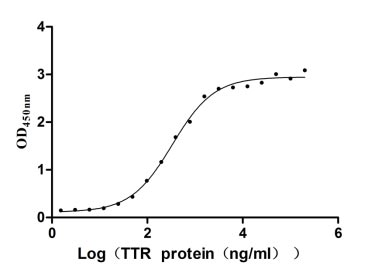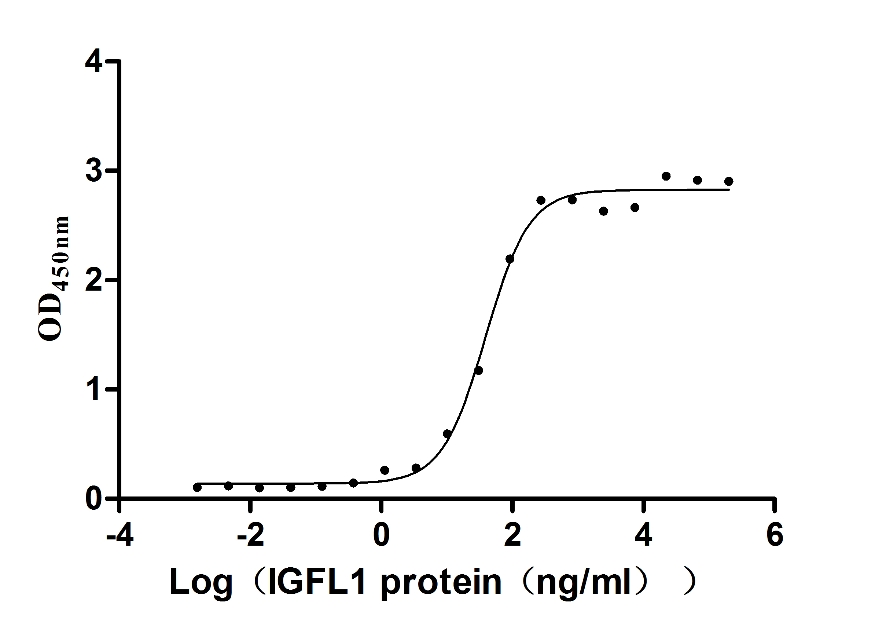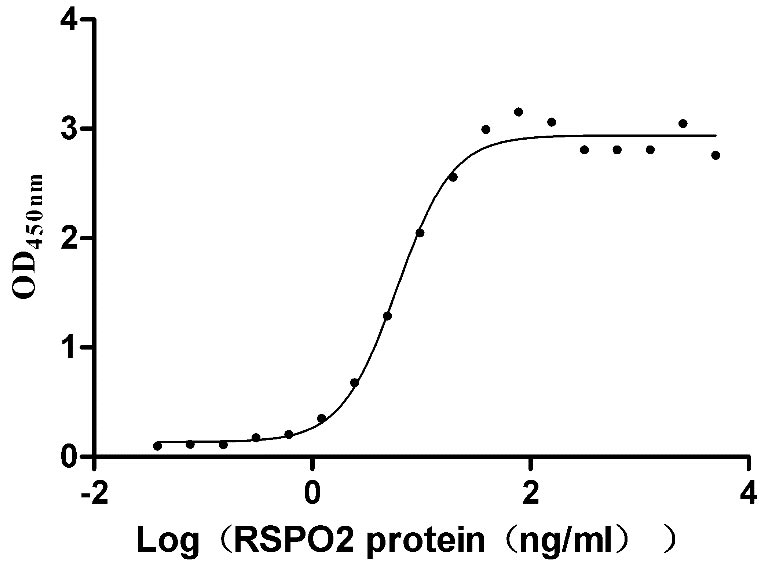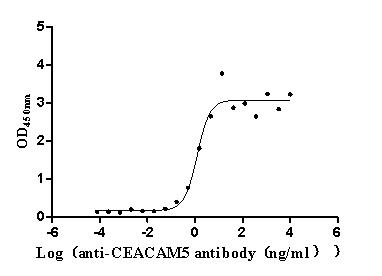Recombinant Mouse Placenta growth factor (Pgf)
-
中文名称:小鼠Pgf重组蛋白
-
货号:CSB-YP017854MO
-
规格:
-
来源:Yeast
-
其他:
-
中文名称:小鼠Pgf重组蛋白
-
货号:CSB-EP017854MO
-
规格:
-
来源:E.coli
-
其他:
-
中文名称:小鼠Pgf重组蛋白
-
货号:CSB-EP017854MO-B
-
规格:
-
来源:E.coli
-
共轭:Avi-tag Biotinylated
E. coli biotin ligase (BirA) is highly specific in covalently attaching biotin to the 15 amino acid AviTag peptide. This recombinant protein was biotinylated in vivo by AviTag-BirA technology, which method is BriA catalyzes amide linkage between the biotin and the specific lysine of the AviTag.
-
其他:
-
中文名称:小鼠Pgf重组蛋白
-
货号:CSB-BP017854MO
-
规格:
-
来源:Baculovirus
-
其他:
-
中文名称:小鼠Pgf重组蛋白
-
货号:CSB-MP017854MO
-
规格:
-
来源:Mammalian cell
-
其他:
产品详情
-
纯度:>85% (SDS-PAGE)
-
基因名:
-
Uniprot No.:
-
别名:Pgf; Plgf; Placenta growth factor; PlGF
-
种属:Mus musculus (Mouse)
-
蛋白长度:Full Length of Mature Protein
-
表达区域:19-158
-
氨基酸序列VH SQGALSAGNN STEVEVVPFN EVWGRSYCRP MEKLVYILDE YPDEVSHIFS PSCVLLSRCS GCCGDEGLHC VPIKTANITM QILKIPPNRD PHFYVEMTFS QDVLCECRPI LETTKAERRK TKGKRKRSRN SQTEEPHP
-
蛋白标签:Tag type will be determined during the manufacturing process.
The tag type will be determined during production process. If you have specified tag type, please tell us and we will develop the specified tag preferentially. -
产品提供形式:Lyophilized powder
Note: We will preferentially ship the format that we have in stock, however, if you have any special requirement for the format, please remark your requirement when placing the order, we will prepare according to your demand. -
复溶:We recommend that this vial be briefly centrifuged prior to opening to bring the contents to the bottom. Please reconstitute protein in deionized sterile water to a concentration of 0.1-1.0 mg/mL.We recommend to add 5-50% of glycerol (final concentration) and aliquot for long-term storage at -20℃/-80℃. Our default final concentration of glycerol is 50%. Customers could use it as reference.
-
储存条件:Store at -20°C/-80°C upon receipt, aliquoting is necessary for mutiple use. Avoid repeated freeze-thaw cycles.
-
保质期:The shelf life is related to many factors, storage state, buffer ingredients, storage temperature and the stability of the protein itself.
Generally, the shelf life of liquid form is 6 months at -20°C/-80°C. The shelf life of lyophilized form is 12 months at -20°C/-80°C. -
货期:Delivery time may differ from different purchasing way or location, please kindly consult your local distributors for specific delivery time.Note: All of our proteins are default shipped with normal blue ice packs, if you request to ship with dry ice, please communicate with us in advance and extra fees will be charged.
-
注意事项:Repeated freezing and thawing is not recommended. Store working aliquots at 4°C for up to one week.
-
Datasheet :Please contact us to get it.
靶点详情
-
功能:Growth factor active in angiogenesis and endothelial cell growth, stimulating their proliferation and migration. It binds to the receptor FLT1/VEGFR-1. Also promotes cell tumor growth.
-
基因功能参考文献:
- elevated PlGF levels may contribute to recruitment and activation of leukocytes. This can subsequently lead to increased pathology of affected organs in addition to mediating acute hypoxia/reoxygenation-triggered vaso-occlusion under sickle cell disease conditions. PMID: 29337222
- Data indicate that VEGF-B is a high-affinity VEGFR-1 ligand that, unlike PIGF, cannot efficiently induce signaling downstream of VEGFR-1. PMID: 23821770
- the lack of PIGF may have contributed to the delayed angiogenic response and the prothrombotic phenotype observed in the PIGF(-/-)animals. PMID: 22126916
- Overexpression of VEGF but not PIGF exacerbated the lipopolysaccharide-mediated toxic effects, supporting a pathophysiological role for VEGF in mediating the sepsis phenotype. PMID: 16702604
- Findings indicate that placental growth factor (PlGF) plays an important role in liver fibrosis-associated angiogenesis and that blockage of PlGF could be an effective strategy for chronic liver disease. PMID: 28378526
- Data demonstrate that PlGF is expressed in vivo and that its expression is restricted to the areas of the tumors where the highest levels of hypoxia occur. Also, hypoxia activates PlGF expression in cultured lymphatic endothelial cells. PMID: 28427198
- Study provides mechanistic and clinical evidence that decreased PLGF levels in the placenta after in utero alcohol exposure are associated to brain angiogenesis defects. Measurement of PLGF levels at birth in the placenta or the fetal blood may serve as a predictive marker for subsequent neurodevelopmental outcomes of exposed fetuses. PMID: 28587682
- PGF deficiency is associated with impaired cerebral vascular development in mice. PMID: 26646502
- PlGF inhibition attenuates PERK activation, likely by tempering hypoxia in HCC via vessel normalisation. The UPR is able to regulate PlGF expression, suggesting the existence of a feedback mechanism for hypoxia-mediated UPR PMID: 26753564
- Data indicate that placental growth factor (PlGF) is needed in the spleen to allow the activation of T cells and blood pressure raising. PMID: 26285836
- Placental growth factor promotes differentiation of bone marrow-derived macrophages and enhanced vascular endothelial cell proliferation. PMID: 26089019
- PLGF in LC cells induced macrophage polarization in vivo, and significantly promoted the growth of LC. PMID: 25961789
- PLGF is upregulated in vascular cells in response to fluid shear stress. PMID: 26408539
- Data suggests that PLGF may target islet endothelia to release growth factors activating PI3k signalling in beta cells to increase their proliferation. In Pre-Eclampsia, PLGF reduction impairs these processes resulting in gestational diabetes mellitus. PMID: 25924650
- The neutrophil elastase-PlGF-JNK/PKCdelta pathway contributes to the pathogenesis of lung epithelial cell apoptosis and emphysema. PMID: 25186164
- E2F1 limits cardiac neovascularization and functional recovery after myocardial infarction by suppressing VEGF and PlGF up-regulation through p53-dependent and -independent mechanisms, respectively. PMID: 25341896
- Pgf knockout mice had higher systolic blood pressure in early and late pregnancy but an extended, abnormal midpregnancy interval of depressed systolic pressure. Knockout kidneys were hypertrophic and had glomerular pathology. PMID: 25537372
- PLGF triggers focal adhesion disassembly in alveolar type II cells via inhibiting the activation of focal adhesion kinase. PMID: 25515701
- Fine branching angiogenesis of anti-mesometrial vessels required both conceptus and maternal PGF. PMID: 25106880
- PlGF mediates the neuroimmune interaction in the spleen, organizing a unique and nonredundant response that allows the onset of hypertension. PMID: 25517614
- These results suggest that PlGF is critical for the development of diabetic retinopathy, and its genetic deletion protects the retina from diabetic damage. PMID: 25187372
- PlGF overexpression prevents angiogenesis by inhibiting Braf, extracellular signal-regulated kinase activation, and downregulation of HIF-1alpha in the mouse placenta. PMID: 25147341
- These results render PlGF an appealing target for ocular wound healing and point to potential therapeutic benefits of PlGF inhibition for the prevention of surgical failure. PMID: 24118824
- The increase in PlGF and PlGF-induced JNK and p38 MAPK pathways contribute to porcine pancreatic elastase-induced lung epithelial cell apoptosis and emphysema. PMID: 24008737
- PlGF positively and negatively modulate tumor growth, angiogenesis, and vascular remodeling through a VEGF-dependent mechanism. PMID: 23918367
- Aldosterone increases early atherosclerosis in regions of turbulent blood flow and promotes an inflammatory plaque phenotype that is associated with PlGF signaling. PMID: 23525413
- Tumor-derived PlGF negatively modulates tumor angiogenesis and tumor growth and may potentially serve as a predictive marker of anti-VEGF cancer therapy. PMID: 23267058
- Plgf1-de gene is a new therapeutic tool for the inhibition of VEGFs driven ocular neovascularization. PMID: 23139276
- The decrease in PlGF and VEGF coupled with the increase in sFlt-1 suggests that Ang-(1-7) may serve as a novel anti-angiogenic therapy for prostate cancer. PMID: 22644934
- PlGF repairs myocardial ischemia through mechanisms of angiogenesis, cardioprotection and recruitment of myo-angiogenic competent marrow progenitors PMID: 21969865
- Placental growth factor is a novel member of the cytokine network of Wallerian degeneration. PMID: 21264946
- Placental growth factor finely tunes a balanced regulation of the tissue inhibitor of metalloproteinases-3/tumor necrosis factor-alpha-converting enzyme axis and the consequent TNF-alpha activation in response to transverse aortic constriction. PMID: 21900081
- PGF is a secreted factor that supports hypertrophy and cardiac function during pressure overload by affecting endothelial cells and fibroblasts that in turn stimulate and support the myocytes through additional paracrine factors. PMID: 21636802
- keratin-positive trophoblast secretion of prolactin-like protein a (Prlpa) and placental growth factor (PlGF) during decidualization are altered in the absence of keratins PMID: 21435445
- Data identify the pro-proliferative VEGF family member placental growth factor (PGF) as an aldosterone-regulated vascular mineralocorticoid receptors target gene in mice and humans. PMID: 20921624
- Placenta growth factor (PlGF) is a novel inducer of plasminogen activator inhibitor-1 (PAI-1) in sickle cell disease PMID: 20351105
- in a knockout mouse model, the absence of PlGF strongly inhibits mucosal intestinal angiogenesis in acute colitis, which is associated with an early increase in intestinal epithelial hypoxia and aggravation of the course of the disease PMID: 20142801
- Neutralization of PlGF using four novel blocking antibodies had no significant effect on tumor angiogenesis in 15 models; data argue against an important role of PlGF during primary tumor growth in most models. PMID: 20371352
- PlGF deficiency delays carcinogen-induced Hepatocellular carcinoma (HCC) and papilloma formation, and that PlGF silencing retards transgenic HCC. PMID: 20371353
- Findings link PIGF to cancer-associated retinopathy, reveal the molecular mechanisms of VEGFR1 ligand-mediated retinopathy. PMID: 20080765
- Placental growth factor is a survival factor for tumor endothelial cells and macrophages. PMID: 12019148
- PlGF overexpression results in an increase in the number, branching and size of dermal blood vessels as well as in enhanced vascular permeability. Injected recombinant PlGF was able to induce vessel permeability in wild-type mice. PMID: 12045226
- stimulated angiogenesis in ischemic heart and limb PMID: 12091877
- demonstrate that absence of PlGF reduces vascular leakage induced by skin wounding, allergens, and neurogenic inflammation PMID: 12150967
- PlGF is an important promoter of arteriogenesis. PMID: 12606258
- results indicated that skin tumor development occurred in a strong angiogenesis-prone scenario in which PlGF and Ang-2 acted cooperatively with VEGF, whereas the negative or stabilizing effect of Ang-1 was abrogated PMID: 12766907
- inducible expression of BF-2, combined with microarray analysis, to identify Placental Growth Factor (PlGF), a Vascular Endothelial Growth Factor (VEGF) family member previously implicated in angiogenesis, as a downstream target of BF-2 PMID: 13678594
- Placental growth factor plays as role in basal adhesion formation and in carbon dioxide pneumoperitoneum-enhanced adhesion formation after laparoscopic surgery in transgenic mice. PMID: 14505757
- PlGF is required for macrophage infiltration in early atherosclerotic lesions in apoE(-/-) mice PMID: 15911697
- PlGF is required for mediating and coordinating the key aspects of fracture repair PMID: 16614757
显示更多
收起更多
-
亚细胞定位:Secreted.
-
蛋白家族:PDGF/VEGF growth factor family
-
数据库链接:
KEGG: mmu:18654
STRING: 10090.ENSMUSP00000004913
UniGene: Mm.4809
Most popular with customers
-
Recombinant Human Transthyretin (TTR) (Active)
Express system: Mammalian cell
Species: Homo sapiens (Human)
-
Recombinant Human Insulin growth factor-like family member 1 (IGFL1) (Active)
Express system: Mammalian cell
Species: Homo sapiens (Human)
-
Recombinant Human E3 ubiquitin-protein ligase ZNRF3 (ZNRF3), partial (Active)
Express system: Mammalian cell
Species: Homo sapiens (Human)
-
Express system: Mammalian cell
Species: Homo sapiens (Human)
-
Recombinant Human Claudin-6 (CLDN6)-VLPs, Fluorescent (Active)
Express system: Mammalian cell
Species: Homo sapiens (Human)






f4-AC1.jpg)










